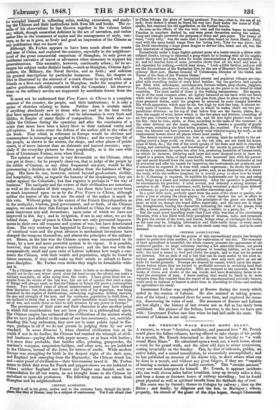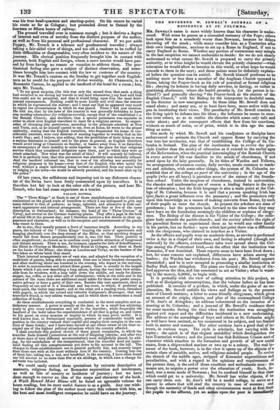MR. TRENCH'S WALK ROUND MONT BLANC.
A FRIEND, in whose "doctrine, assiduity, and pastoral love" Mr. Trench could place the fullest reliance, having offered to take charge of his pariah for a month, Mr. Trench determined to devote his holyday to "a walk round Mont Blanc." He calculated upon a week out, a week home, about a week for his grand walk, and the other odd days to minor excursions, resting invariably on the Sunday. This, by dint of railroads, guides, an active habit, and a sound constitution, he successfully accomplished ; and he has published an account of his Alpine trip, to show others what can be done in a month, and without any great fatigue, if they are "capable of bearing a certain amount of bodily exertion." This "certain amount" every one must interpret for himself Mr. Trench, it appears incident- ally, can walk eleven miles before breakfast, keep up twenty miles a day, and bear a dozen or fourteen hours of railway travelling; but he found great physical as well as spiritual benefit from the Sabbath day of rest.
His route was by Ostend ; thence to Cologne by railway ; then up the Rhine ; and finally, by diligence and the feet, to Martigny ; where, properly, his circuit of the giant of the Alps began, though Chamonix was his true head-quarters and starting-point. On his return he varied his route so far as Cologne ; but proceeded direct to Ostend by the fourteen or fifteen hours of railway.
The ground travelled over is common enough ; but it derives a degree of interest and even of novelty from the distinct purpose of the author, as well as from his personal and professional character. If we put aside Popery, Mr. Trench is a tolerant and goodnatured traveller ; always taking a fair-aided view of things, and too old a roadster to be ruffled by little difficulties or disagreeables, very often incident to the nature of the journey. His clerical position frequently brought him in contact with persons, both English and foreign, whom a mere tourist would have pas- sed by from having no reason or vocation to address them. The pro- fessional feeling also gave a subject of distinct observation, and some- times brought him into contact with the law or customs of the country. It was Mr. Trench's custom on the Sunday to get together such English- men as he could for the purpose of divine worship. At Chamonix, in a Romanist Canton, he applied to the landlord of the hotel for a room ; but, says Mr. Trench, " To my great surprise, (for this was only the second time that such a thing bad occurred to me during my travels in any land whatsoever,) my host said that this could not be permitted, and that it would bring upon him the most detri- mental consequences. Nothing could be more kindly and civil than the manner in which he represented the matter; and I must say that he appeared very much to regret the circumstances in which be was placed. These I will now mention. He told me, that by the laws of the country it was generally forbidden to have any meeting whatsoever for religious worship, except that of the established i.e. the Banish Church; and therefore, that a spial permission was requisite in order to allow even English travellers to meet for a religious service. In expect- ation of obtaining this permission, according to the principle admitted at Nice and Turin, and., as he himself quoted to me, even at Rome, he wrote to the proper authority, stating that the English travellers, who frequented his house in con- siderable numbers were very desirous of meeting together to worship God on the
I
Lord's Day; and, believe, also adding, that the prohibition of their doing so was a serious detriment to himself and to the place in general, as English travellers would avoid being at Chamonix on Sunday, or hasten away from it on Saturday, in consequence of their inability to unite together in the place for that religions service which they considered obligatory upon them, and to which they were so ranch attached. Now what was the result of this? It will scarcely be believed, but it is perfectly true, that this permission was absolutely and decidedly refused. And the landlord informed me, that in case of his allowing any assembly for religious purposes in his house—even that of the English who were under the roof, without a single individual being invited or admitted from any other hotel or lodging in the town—he would be severely punished, and his house shut up by the police."
Of late years, the selfishness and imposing not to say dishonest charac- ter of the Swiss have been freely commented upon by travellers. It is therefore but fair to look at the other side of the picture, and hear Mr. Trench, who has had some experience as a tourist.
PALACE HOTELS.
The " Three Kings" at Basle is one of those establishments on the Continent maintained on the grand route of travellers to which I am indisposed to give any name inferior to that of palaces; so large, splendid, and attractive is their out- ward appearance and internal arrangement. There are four or five of the same description in Switzerland: for instance, the hotel of the " Three Crowns " at Vevey, and several at the German watering-places. They offer a page in the book of social life at the present day; and I therefore mention a few details in their ap- pearance and character, as well as in the reception and entertainment of the guests who resort to them.
As to size, they usually present a front of immense length. According to my paces, the balcony of the Three Kings" fronting the suite of apartments and hanging absolutely over the deep stream of the Rhine, so that anything dropped would fall from thence perpendicularly into it, was 150 feet. Their position is often magnificent; so chosen as to combine every possible attraction of foreground and distant scenery. There is one, for instance, opposite the falls of Schaffhausen; the Hotel de l'Europe at Manheim; Hotel Royal at Cologne, and those at Basle on the banks of the Rhine; also those at Lucerne and Vevey, on the borders of the two lakes on whose bank they stand. Their internal arrangements are of vast size, and adapted for the reception of a multitude of guests, being able to entertain from one to three hundred occupants, and often receiving above one hundred in the evening, who depart in the morning. In order to accommodate and attract these guests, there is usually in the largest hotels which I am now describing a long saloon, having the very best view attain- able from its windows, with a long table down the middle, set ready for dinner, supper, tea, coffee, or any other sort of refreshment; while at the sides and in the corners of the room there are additional small tables forthose who prefer compa- rative privacy or have a party of their own. Besides this vast apartment, there is frequently at one end of it a breakfast and tea-room, to which, if preferred as more quiet, the visiter may resort; and at the other end a reading-room, furnished with papers, in which the valued and valuable Galignani's Messenger, that real traveller's friend, is very seldom wanting, and in which there is sometimes a small collection of books.
At these establishments everything is conducted in the most complete and sa- tisfactory manner. A porter is usually at the door, or in a small box adjoining, ready to give every information and aid to the iraveller i while frequently the landlord of the hotel takes the superintendence of all that is going on, and comes to his guest on every occasion or inquiry in which he may prove useful. It is well known that, in Switzerland especially, persons of considerable wealth and position in the country embark their capital and employ their energies in the con- duct of these hotels; and I have been myself at one whose owner at the time oc- cupied one of the highest political situations which the country afforded. I shall conclude thiscneral sketch of these grand receptacles, in which the traveller finds himself sometimes at the end of fatiguing journies, and after two or three days of very di different accommodation) most delightfully placed, by add- ing, for the satisfaction of the inexperienced, that the traveller need not appre- hend finding all this sumptuousness put down to his account in the bill. The charges in these establishments are in general perfectly fair, and scarcely larger than these met with at the most ordinary inns of the country. Coming into one of them late, taking tea, a bed, and breakfast in the morning, I have often found my bill amount to no more than five or six shillings, in which sum a charge for servants was included.
We could easily extend these quotations by extracts descriptive of manners, religious feeling, or Romanist superstition and intolerance, as well as bits of scenery or incidents of journey ; but we have done enough to convey an idea of the scope and character of the book. A Walk Round Mont Blanc will be found an agreeable volume for home reading, but its most useful feature is as a guide. Any one wish- ing to follow the plan of the author must carry this volume with him, as the best and most intelligent companion he could have on the journey.



























 Previous page
Previous page